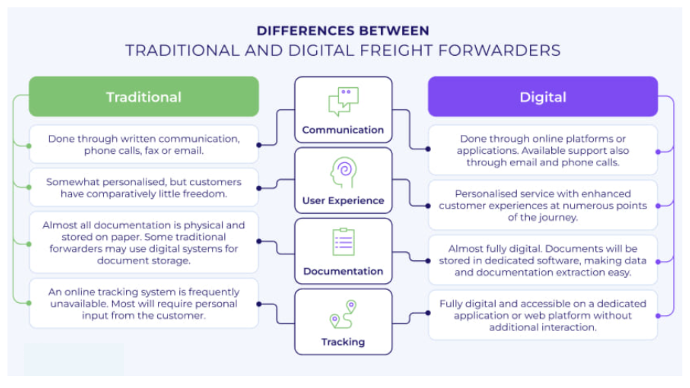When it comes to freight forwarding, shippers have the option to choose between traditional and digital freight forwarders. While both types of freight forwarders offer similar services, such as transportation and logistics, they differ in terms of how they operate and the technology they use.
Traditional freight forwarders have been around for the longest time. However, digital transformations aren’t as common as in other sectors, with the logistics industry slow to revolutionise. However, these trends are changing as digital freight forwarders become a more popular option among shipping companies. Ease of access, a greater selection of carriers, and a fully digitised service are some benefits digital freight forwarding companies provide.
I. What is a traditional freight forwarder?
Traditional freight has dominated the trade practice in the industry for a long time and has a wealth of experience in logistics and transportation. Traditional freight forwarders rely (almost) exclusively on written and audio (i.e., phone calls) communication as their main way of doing business. Consequently, they do not own any platform outside of a business website.
Since there is no communication, file sharing, and documentation platform, the freight forwarder and their customers rely on various written agreements and continue phone calls with carriers to negotiate rates, prepare documentation, and keep up with any changes during deliveries.
II. What are digital freight forwarders?
A digital freight forwarder is a company with a platform where users can manage the entire process without involving a third party. These platforms may be marketplaces, websites, or applications, which can streamline and optimize the freight forwarding process. They offer real-time visibility, automated documentation, and other features that can help shippers to take decisions based upon data visible in real-time can manage their cargo more efficiently.
Additionally, most digital freight forwarders will provide more services as they access more data. Digital platforms allow them to use big data to assess rates and carriers and provide insights into shipping efficiency.
Other advantages digital technologies have:
- In-depth cargo tracking
- Artificial intelligence
- In-built invoicing
- Documentation management
III. Differences between traditional and digital freight forwarders
Although both companies operate within the logistics industry, there are inherent differences in their services. Certain aspects are handled more effectively by a traditional freight forwarder, while digital methods excel in other areas. Explore the essential distinctions between the two in the image below.

IV. Benefits of digital freight forwarders
1. Faster quoting process
Digital forwarders often have implemented partial or complete quotation automation. As a result, their customers can visit the associated website or application, browse the available carriers, and instantly get recommendations and rates.
Contrasted with traditional freight forwarding businesses, digital ones make the selection process much quicker, which allows companies to focus more on shipping goods instead of finding a good partner.
2. Analytics
Digital freight forwarding companies will have inbuilt data tracking and analytics services into their platforms. Businesses with dedicated teams can collect all data acquired from shipping and optimise internal practices.
3. Automation
Some digital forwarders will have APIs that allow developers to send automated messages to an endpoint. In other words, with some developers, shipping companies can completely automate carrier selection, payments, and many other processes.
4. Reduced paperwork
A digital transformation means moving away from paper. Instead, most documentation is uploaded to the cloud or other services, making it accessible immediately. So, the benefits of digital forwarders are two-fold – reduced paperwork and easier access to important documentation.
V. Conclusion
I believe the above article has provided you with useful information about the differences between traditional and digital freight forwarding system. At the same time, the article also points out some benefits of why new technology should be applied to traditional freight forwarders. If you have any questions, please contact us immediately for further advice.